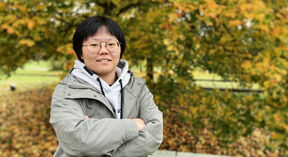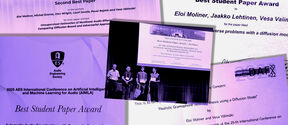Introducing Qi Chen: Trustworthy AI requires algorithms that can handle unexpected situations

Qi Chen has just arrived in Finland. As both assistant professor of computer science at Aalto University and member of the ELLIS Institute faculty, Chen is joining a fast-growing research community focused on studying and understanding the next generation of machine learning and AI systems. Amidst settling into Otaniemi campus, Chen is already shaping her research agenda.
Her work focuses on developing artificial intelligence that is trustworthy, efficient, and fair, particularly in unpredictable and changing environments. She does this by designing new algorithms to ensure that AI systems behave reliably, avoid bias, and respect values such as equality.
‘AI is increasingly expected to make decisions in real-life settings that are unpredictable and varied. One example is self-driving cars and how to ensure they don’t cause accidents. Another important issue is healthcare applications, where AI tools’ possible bias needs to be addressed properly. If we cannot trust such systems, it reduces overall trust and increases inequality throughout society,’ Chen explains.
‘As we advance trustworthy AI, we have the opportunity to build systems that not only make our world more efficient and safe but also stay true to the values that define us as humans,’ she says.
Engineering tricks were not enough
Qi Chen’s journey into research began with her innate curiosity.
‘Before joining academia, I worked with speech recognition algorithms at China's major internet companies. I noticed that there were many problems that couldn’t be solved with engineering techniques. This sparked my interest in pursuing a doctorate and a career in research.’
Before joining Aalto and the ELLIS Institute, Chen worked as postdoctoral fellow at the University of Toronto. For Chen, becoming part of the ELLIS community stands out as a significant milestone in her career.
‘The collaboration opportunities and resources at ELLIS Institute Finland and Aalto are remarkable. Here, researchers share data with each other and professors are ready to provide guidance. Artificial intelligence is approached from many different angles, and there is also enormous computing capacity available. This provides an excellent starting point for cutting-edge AI research. I believe that I can learn a lot here and also contribute a lot.’
AI to benefit societies, not tech experts
Looking ahead, Chen aims to establish a research group dedicated to advancing trustworthy and controllable generative AI and its role in accelerating scientific discovery. She is currently interviewing talented students with strong backgrounds in mathematics and programming, as well as those with expertise in AI for Science. She is also actively working on collaborations with institutions like the University of Toronto and Princeton University.
Qi Chen sees a lot of potential in the way AI can enhance our understanding of the world. Her ultimate goal is to create AI that benefits society as a whole, not just technology experts.
‘In my field of research, we try to understand how to use human knowledge and how to combine it with machine intelligence. If this succeeds, I believe our understanding of the world will improve. Who knows, maybe we will be closer to artificial general intelligence capable of understanding and learning any task performed by humans.’
This article was originally published on the Aalto University website on 14.10.2025
Read more news
A survey on users' experiences of Mykanta in collaboration between Aalto University and Kela
Senior university lecturer Sari Kujala's research group is exploring, in collaboration with Kela, users' experiences with the Mykanta online patient portal and the MyKanta mobile application.
Specialised AI models could be Finland's next global export
Finland has the potential to build AI solutions that are different from ChatGPT-like large language models. Aalto University's School of Electrical Engineering already has decades of experience in developing specialised, resource-efficient AI models. They could be a key component of future 6G networks, automation, and industrial systems – and the next competitive edge of our country.
Professor Patric Östergård becomes a member of the Finnish Society of Sciences and Letters
Finnish Society of Sciences and Letters is Finland's oldest science academy. It promotes scientific discussion, publishes scientific literature, awards prizes and provides financial support for research.